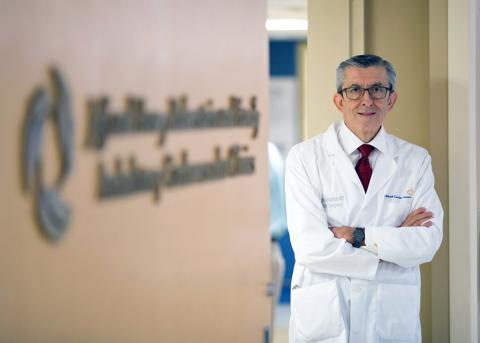
The Society for Vascular Surgery mourns the death of Dr. Kenneth Wayne Johnston, an SVS member, former president and recipient in 2009 of SVS’ highest honor, the Lifetime Achievement Award.
Dr. Barry Rubin, chair and program medical director for the Peter Munk Cardiac Centre for the University Health Network in Toronto, writing with other colleagues, called Dr. Johnston “one of Canada's preeminent and gifted academic surgeons … Dr. Johnston was a visionary leader, educator, researcher and tireless advocate for vascular surgery who cared for his patients with kindness and compassion. His surgical skills were outstanding and always carefully applied and he was a patient teacher of clinical skills to a large cohort of residents and fellows. Dr. Johnston's work ethic was legendary, and he led by example, always contributing, learning and exploring new areas of research to apply to patients with vascular disease. He continuously questioned current dogma and used the scientific approach to develop new diagnostics and therapies and instilled this quest in the trainees who were privileged to work with him. Dr. Johnston set very high standards for himself and strove each day to meet them – we and many others were deeply influenced by watching Dr. Johnston reach those standards and are much better today because of it.”
In the United States, Dr. Johnston played a critical role in brokering the merger of the two American vascular societies to become the Society for Vascular Surgery, overcoming strong resistance to the merger at the time. He served as vice president and then president, in 2008, leading the development of SVS’ first strategic plan. He received SVS’ Lifetime Achievement Award in 2009, to recognize his outstanding and sustained contributions to the profession of vascular surgery and to Society itself. He is the only Canadian to ever have received this most prestigious award.
Said SVS Treasurer and colleague of Dr. Johnston, Dr. Thomas Forbes, “Wayne was the penultimate vascular surgeon, scholar, leader and educator. More importantly he was a loving family man and trusted mentor, colleague and friend. We all looked to him for his sage advice and wisdom. He will be sorely missed but we’ll all try to continue his legacy, locally, nationally and internationally.”
Dr. Johnston was a pioneer and driving force in the establishment of the Canadian Society for Vascular Surgery 40 years ago and served as both its secretary and president. Today, the Society is internationally recognized and is Canada's most important forum for supporting professional education, research and standards of care related to the prevention, diagnosis and treatment of vascular conditions, said Dr. Rubin.
At the University of Toronto, Dr. Johnston established the Division of Vascular Surgery and was its inaugural chair, a position he held for more than 20 years. As a teacher and mentor, he established the first vascular surgery training program in Canada and trained a generation of vascular surgeons, many of whom he inspired to go on to have distinguished careers in academic and community medicine. A strong proponent of multidisciplinary approaches to research, he supervised 43 masters and doctoral-level engineers.
Dr. Johnston played a major role in setting the standards for accreditation of training in vascular surgery that were adopted by the Royal College of Physicians and Surgeons of Canada. He co-edited the seventh and eight editions of “Rutherford's Vascular Surgery,” the standard, definitive medical reference text for a range of health professionals including vascular surgeons, interventionalists and vascular medicine specialists worldwide, and was the first and only Canadian to do so. For seven years he was editor- in-chief of SVS’ peer-reviewed scientific journal, the Journal of Vascular Surgery, and was the first Canadian to be honored with this responsibility.
As a clinical scientist, Dr. Johnston's research greatly improved the care of patients with vascular disease, and his vascular research lab was one of the first in North America. His impact on the understanding and treatment of patients with vascular disease was unparalleled. Dr. Johnston published seminal papers detailing the results of the world's first major prospective study of patients that established the role of balloon angioplasty of the arteries of the legs in treating patients with impaired circulation, preventing disabling pain and amputations. His research changed the way that patients with blocked arteries are treated and this procedure is now recognized internationally as the treatment of choice.
In the late 1980s and early 1990s, Dr. Johnston led the first and largest Canadian-based multicenter study of abdominal aortic aneurysms in the world. The study results had a significant impact on the selection and treatment of patients with abdominal aortic aneurysms and continue to be used to identify patients at increased risk of major surgery who would benefit from new and less invasive approaches. Remarkably, Dr. Johnston had 34 years of continuous funding from the Canadian Institute for Health Research for his research into the development and use of ultrasound.
In 2018, Dr. Johnston was invested as a Member of the Order of Canada, one of the country's highest civilian honors. “Dr. Johnston left an indelible mark on us, and we are privileged to have known, been trained by and worked with him for so many years. He will truly be missed,” said Rubin.
Dr. Johnston is survived by his wife Liz Cain, his daughter Andrea (Andrew) and son Matthew (Paloma) and grandchildren Mercer, Maren, Myles and Piers. Wayne was predeceased by his wife of almost 50 years, Dr. Jean Turley.
His funeral will be July 5 in Toronto. Memorial contributions may be made to to the Princess Margaret Cancer Foundation or to the Dr. K. Wayne Johnston Memorial Fund.
(This obituary was written primarily by Dr. Johnston’s colleagues, Drs. Barry Rubin, Thomas Lindsay, Graham Roche Nagle, Thomas Forbes and Paul Walker.)